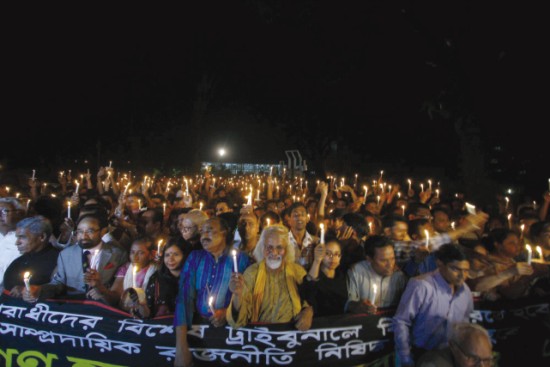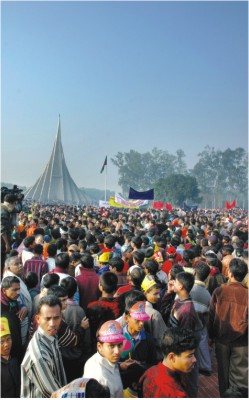
Inside
|
The Ticking Clock Syed Abdus Samad argues that claims for truth to be made public can no longer be avoided
The subject is well known, extensively debated and beset with a lot of unanswered questions and a few controversies as well. Nearly 38 years after those heinous and grisly crimes were committed, the issue has surfaced once again, largely because the party which had led the national war of liberation of Bangladesh in 1971, the Awami League and its allies, have now come to power through a massive mandate. This has raised hopes and expectations that the long aborted trials would finally be successively concluded. The Sector Commanders' Forum, the civil society, the Ghatak Dalal Nirmul Committee, the combined cultural ensemble, the Muktijuddho Jadughar and other pro- liberation progressive forces have all along been demanding trials for the atrocities committed by the Pakistani forces and their collaborators in the strongest possible language. The previous BNP-led 4-party alliance government (2001-2006) was quite indifferent to these demands and did not even bother to concoct reasons or arguments to evade the issue. Their reasons for ignoring the issue are not very difficult to surmise. I have heard comments and observations that "all" past governments had failed to act to resolve this issue. This is not correct and I would like to put on record the initiatives taken by the Mujibnagar and the subsequent Awami League government (1996-2001) to put the criminals of 1971 on trial for committing war crimes like genocide, treason, waging war on Bangladesh, etc. Those were timely and effective steps but the sudden and violent changes in the political scenario in 1975 did not allow them to come to fruition. The political landscape of Bangladesh changed dramatically thereafter. The Mujibnagar government had made a full list of all war criminals (zone-and sector wise) with records of their crimes and evidence thereof, including eyewitness accounts. A blueprint for the trials was also prepared. After liberation on December 16, the government enacted the Collaborators' Order of 1972, a special law to try those who had committed a) murder; b) rape; c) arson; and d) other cognisable offences as defined in the Penal Code. The one offence which was not listed or defined in the Code was "collaboration with the occupation forces of Pakistan and their lackeys." This was done to keep things simple and manageable from a legal point of view. The criteria for identifying the collaborators and the procedure for their trials were clearly outlined in the Order. This was a stringent law and there was no provision of bail for the accused. The trials were to be in civil courts and conducted by special tribunals which were also duly constituted. Hundreds of cases were filed against the collaborators and war criminals of 1971 in the 20 administrative districts of Bangladesh. I was Deputy Commissioner of Chittagong district in 1972 and, if I remember clearly, more than 100 cases were registered under the Collaborators' Order against perpetrators of war crimes in that district. These cases were duly investigated and charge sheets filed. However, while this complex and lengthy process was unfolding, the whole political scenario changed on August 15, 1975, with the staging of a military coup in which the prime minister, Bangabandhu Sheikh Mujibur Rahman, along with nearly all the members of his immediate family, were brutally assassinated. This coup d'etat and subsequent events were, in fact, largely responsible not only for the stagnation in the trials but the political rehabilitation of many of the war criminals who were, at that time, in jail awaiting trial. The Collaborators' Order was repealed, and all cases filed under its jurisdiction, dismissed. The war criminals were garlanded like heroes as they came out of the jail gates! Few people remember the events that took place in the post-1975 period during the governments of Khandakar Mushtaque Ahmed (a renegade Awami League leader and one of the main architects of the coup), Justice A. Sayem and General Ziaur Rahman. All the released war criminals began actively participating in the political activities of the country from which the Awami League was virtually excluded. It is my strong conviction that, had the Mujib government succeeded in completing its full term of office, the war crimes trials would have been completed and all those found guilty, convicted, sentenced and punished. Unfortunately, that was not to be. The brutal assassination of Bangabandhu and the subsequent change of state power changed the course of history in such a manner that the spirit of the freedom struggle and the liberation war had to take a back seat for more than 20 years. The collaborators, war criminals and enemies of Bangladesh succeeded, beyond their wildest dreams, to establish themselves in the political domain and implant the seeds of hatred against the very values for which Bangladesh was created in the first place. It may be recalled that religion based politics was banned by the government in 1972 (since Bangladesh was constitutionally made a secular country) and this had effectively paralysed the criminals of 1971 whose politics was religion-based. After 15th August 1975, they came back with a vengeance and made up for lost time. Many of the events that occurred during the period between 1975 and 1996 are covered in a black shroud and these need to be uncovered and analysed. The persons holding state power 1975-1996 and 2001-2006 were not at all interested in bringing the war criminals to book and had, in fact, helped to rehabilitate them in the political arena, thereby enabling them to solidify and strengthen their position in the body politic of Bangladesh. The time has now come to restore a balance by holding trials of those against whom there are specific charges of treason, genocide, murder and assault. Today's priorities:
Once, I was questioned by a talented young lawyer from Bangladesh, Dr. Shirin S. Choudhury, on the meaning of justice, at the Tribhuvan airport in Nepal, where both of us had gone to attend a meeting on poverty alleviation. I did not know how to answer that question because justice is a term fraught with implicit value judgments. Observing my discomfort, she provided me with some leads and they were: fairness, evenness, affordability, social acceptability, speed, restoration of feelings of satisfaction in the aggrieved parties and due process of law. I suppose these comprehensively answer the question as to what the tenets of true justice should be. To come back to the trials for the war crimes committed in 1971, some people ask what purpose will be served now after so many years? What would be the benefit? What would the victims gain? In response to these cynical questions, I would like to refer to the unrelenting efforts of the state of Israel to hunt down and try the Nazi war criminals many years after the Nuremberg trials were over. Eichman, for example, was hunted down and brought back to Israel from Argentina to face trial more than 25 years after Nuremberg. There are many similar examples. The souls of the three million martyrs of 1971 would, at least, find some solace if their killers are tried and punished. So would those who were crippled, maimed and rendered homeless. There is no statute of limitations for such offences, and it is never too late to bring the criminals to "justice" which would represent, a la Dr. Shirin Choudhury, "a restoration of feelings of satisfaction," irrespective of the verdicts of the trials. Not all will be found guilty. That is to be expected. But the vast majority of those indicted are likely to be convicted. We have often heard that justice delayed is justice denied. But what about justice absent? What about justice for the millions of freedom fighters who were slain by these criminals who, subsequently, rode rough shod over the political, social and cultural arena of Bangladesh for almost 40 years, acquired positions of power, amassed fortunes, went on to commit more crimes and became high officials, ambassadors, members of parliament and even ministers? Who will answer these questions? But the time has come to answer them, and they must be answered to the satisfaction of all concerned. For this, the trials are both a necessary and sufficient condition. There is no need to involve the UN, the International Court of Justice at the Hague or the International Human Rights Commission. I am not diminishing the importance of these institutions, but such involvement would complicate and delay the dispensation of justice. Simple justice, denied for 38 long years! Not revenge, but justice! We know the offences, we know the offenders, we know the witnesses and we have our own laws and procedures. Do it like the Israelis did. As a freedom fighter, I strongly feel that it is high time, and no further delay in holding of the trials should be tolerated. The symbolic value of such trials is incalculable and can only be appreciated by those who have suffered. The glorious history of our liberation war would remain incomplete without these trials. This is an opinion which is almost universally shared in Bangladesh. In a democracy, you have to respect the will of the majority. In Bangladesh, the majority have spoken. Listen to their voice and act now. Syed Abdus Samad is a Freedom Fighter and former Private Secretary to Prime Minister Bangabandhu Sheikh Mujibur Rahman and Principal Secretary to Prime Minister Sheikh Hasina. He was a Zonal Administrative Officer in the Mujibnagar Government in 1971 and is now a Professor of Economics at an Asia-Pacific University in North-east Asia. The views expressed in this article are his own.
|

